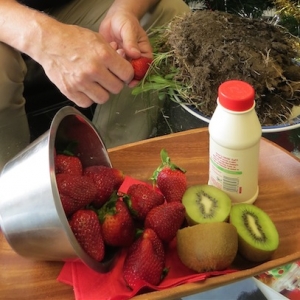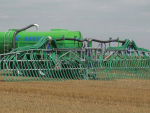With World Soil Day approaching on 5 December, Ballance Agri-Nutrients science strategy manager Warwick Catto says its time to give a little thanks from the ground up.
"Good food starts with great soil, yet it is something we all take for granted. It's not sexy. It's dirt when it's in the wrong place and it's the last thing you want to find in your salad. But when you consider that all life on earth depends on soil, we would be in serious trouble without it.
"It can take at least 500 years to create just 2.5 cm of topsoil from rocks, so World Soil Day is a good time to say thanks to Mother Nature for the hard work and to all those farmers, growers and the backyard gardeners who work with soil every day to keep families fed."
With almost half New Zealand's land mass farmed and primary industries forecasts of more than $35 billion for the coming year, New Zealand's economy owes a significant share of its performance to soil says Catto.
"Soil is integral to our economic success, but we need to look after it. It is not a 'one size fits all' blanket. The natural fertility of soils and our soil types vary around New Zealand, so responsible use of fertilisers is important to balance nutrients in the soil for plant and animal growth."
Catto says World Soil Day is a reminder that impacts such as erosion, carbon loss, and urban expansion over farmland need careful management, especially in an agriculturally dependent economy like New Zealand's.
He says cooks planning the Christmas menu might want to add a little side dish of soil.
"It's a good reminder of where great food comes from and a sobering reminder of where we would be without it."
Eight fun facts about soil
1. All life on earth depends on soil.
2. Soil and dirt are not the same. Soil scientists point out the difference between soil and dirt. Soil is a natural material in its proper place, but dirt is soil in the wrong place, such as on one's shoes or car.
3. The New Zealand Soil Classification (the system used to identify and name soils) defines soil as any natural material on the land's surface that has the potential to support life, even if that is only bacteria.
4. The soil stores reserves of water for plants, controls water seepage into streams and groundwater, and reduces rapid runoff that could cause erosion and floods.
5. Soil stores carbon (in New Zealand, it stores about four times more than plants), so it helps minimise the release of carbon dioxide into the air.
6. Soil microbes help absorb nitrogen from the air and feed it to plants. As the rock fragments decay, they release nutrients.
7. Soil filters water, and helps absorb and break down toxins.
8. Soils link natural systems above ground – plants, animals, landforms, surface water and the atmosphere – with natural systems below ground, such as rocks and groundwater.



















